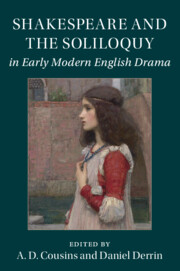Book contents
- Shakespeare and the Soliloquy in Early Modern English Drama
- Shakespeare and the Soliloquy in Early Modern English Drama
- Copyright page
- Contents
- Acknowledgements
- Notes on Contributors
- Introduction
- Chapter 1 Roman Soliloquy
- Chapter 2 Tudor Transformations
- Chapter 3 Doubtful Battle: Marlowe’s Soliloquies
- Chapter 4 Shakespeare and the Female Voice in Soliloquy
- Chapter 5 Contemplative Idiots in Soliloquy: Rhetorical Parody, Laughable Deformity and the Audience
- Chapter 6 Giving Voice to History in Shakespeare
- Chapter 7 Hamlet and Of Truth: Humanism and the Disingenuous Soliloquy
- Chapter 8 Choosing between Shame and Guilt: Macbeth, Othello, Hamlet, and King Lear
- Chapter 9 ‘Too hot, too hot’: The Rhetorical Poetics of Soliloquies in Shakespeare’s Late Plays
- Chapter 10 Ben Jonson’s Roman Soliloquies
- Chapter 11 Ben Jonson’s Comic Selves
- Chapter 12 ‘In such a whisp’ring and withdrawing hour’: Speaking Solus in Middleton’s The Revenger’s Tragedy and The Lady’s Tragedy
- Chapter 13 John Ford’s Soliloquies: Solitude Interrupted
- Chapter 14 Davenant’s Macbeth: Soliloquy, Counter-Revolution and Restoration
- Chapter 15 What Were Soliloquies in Plays by Shakespeare and Other Late Renaissance Dramatists? An Empirical Approach
- Notes
- Select Bibliography
- Index
Chapter 8 - Choosing between Shame and Guilt: Macbeth, Othello, Hamlet, and King Lear
Published online by Cambridge University Press: 27 July 2018
- Shakespeare and the Soliloquy in Early Modern English Drama
- Shakespeare and the Soliloquy in Early Modern English Drama
- Copyright page
- Contents
- Acknowledgements
- Notes on Contributors
- Introduction
- Chapter 1 Roman Soliloquy
- Chapter 2 Tudor Transformations
- Chapter 3 Doubtful Battle: Marlowe’s Soliloquies
- Chapter 4 Shakespeare and the Female Voice in Soliloquy
- Chapter 5 Contemplative Idiots in Soliloquy: Rhetorical Parody, Laughable Deformity and the Audience
- Chapter 6 Giving Voice to History in Shakespeare
- Chapter 7 Hamlet and Of Truth: Humanism and the Disingenuous Soliloquy
- Chapter 8 Choosing between Shame and Guilt: Macbeth, Othello, Hamlet, and King Lear
- Chapter 9 ‘Too hot, too hot’: The Rhetorical Poetics of Soliloquies in Shakespeare’s Late Plays
- Chapter 10 Ben Jonson’s Roman Soliloquies
- Chapter 11 Ben Jonson’s Comic Selves
- Chapter 12 ‘In such a whisp’ring and withdrawing hour’: Speaking Solus in Middleton’s The Revenger’s Tragedy and The Lady’s Tragedy
- Chapter 13 John Ford’s Soliloquies: Solitude Interrupted
- Chapter 14 Davenant’s Macbeth: Soliloquy, Counter-Revolution and Restoration
- Chapter 15 What Were Soliloquies in Plays by Shakespeare and Other Late Renaissance Dramatists? An Empirical Approach
- Notes
- Select Bibliography
- Index
Summary
- Type
- Chapter
- Information
- Shakespeare and the Soliloquy in Early Modern English Drama , pp. 105 - 118Publisher: Cambridge University PressPrint publication year: 2018



